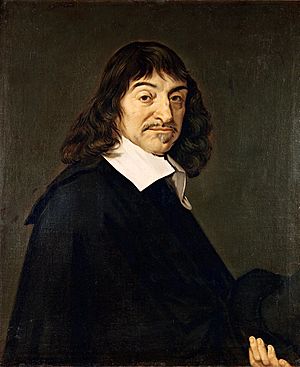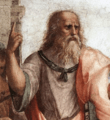Rationalism facts for kids

Rationalism is a way of thinking that says we can gain true knowledge just by using our reason and logic. It's like solving a puzzle in your mind without needing to look up answers or do experiments. This idea became a big philosophical movement in the 17th century, but people had similar thoughts even before then.
Rationalist thinkers believe that if we think hard enough and logically, we can understand many things. They don't think humans can know everything this way, but they believe it's possible to understand big ideas like God or the soul just by using our minds.
Contents
What is Rationalism?
Rationalism is the belief that our minds and logic are the main ways to find out what is true. It suggests that some knowledge is already inside us, or can be figured out just by thinking. This is different from believing that all knowledge comes from what we see, hear, or touch (our senses).
Imagine you know that 2 + 2 = 4. You don't need to see two apples and then two more apples to know this. You just know it through reason. Rationalists believe that many other truths can be found in a similar way.
Key Thinkers in Rationalism
The ideas of rationalism became very popular in the 17th century and 18th century. Some of the first philosophers to really explore these ideas were Marin Mersenne and René Descartes. Descartes is famous for his saying, "I think, therefore I am," which shows how much he trusted the power of his own mind.
Other important philosophers who were rationalists include:
- Baruch Spinoza: He tried to explain the universe and God using very logical, almost mathematical, arguments.
- Gottfried Leibniz: He believed the universe was made of tiny "monads" and that everything happens for a reason.
- Immanuel Kant: He combined ideas from rationalism and other philosophies, saying that our minds actively shape how we experience the world.
Not everyone agreed with rationalism. Some famous thinkers who had different ideas were David Hume and John Locke. They believed that most of our knowledge comes from our experiences and senses, not just from thinking.
How Rationalism Influenced Other Ideas
Rationalism had a big impact on other areas of thought:
Natural Law
Rationalism helped develop the idea of natural law. This is the belief that there are certain laws that are true everywhere and for everyone, because they are part of nature itself. These laws are not made by humans, but can be discovered through reason. For example, the idea that all people have a right to life might be seen as a natural law.
Deism
Rationalism also influenced Deism. Deism is a belief that a supreme being (like God) created the universe, but then let it run on its own, like a clockmaker who builds a clock and then lets it tick. Deists believe that we can understand this creator and other religious truths by observing nature and using our reason, rather than relying on religious books or special messages. They felt that if you looked at the order and rules in nature, you could figure out that a powerful being must have designed it.
Images for kids
-
Detail of Pythagoras with a tablet of ratios, numbers sacred to the Pythagoreans, from The School of Athens by Raphael. Vatican Palace, Vatican City.
-
Plato in The School of Athens, by Raphael.
-
Ibn Sina Portrait on Silver Vase.
See also
 In Spanish: Racionalismo para niños
In Spanish: Racionalismo para niños
 | Audre Lorde |
 | John Berry Meachum |
 | Ferdinand Lee Barnett |




